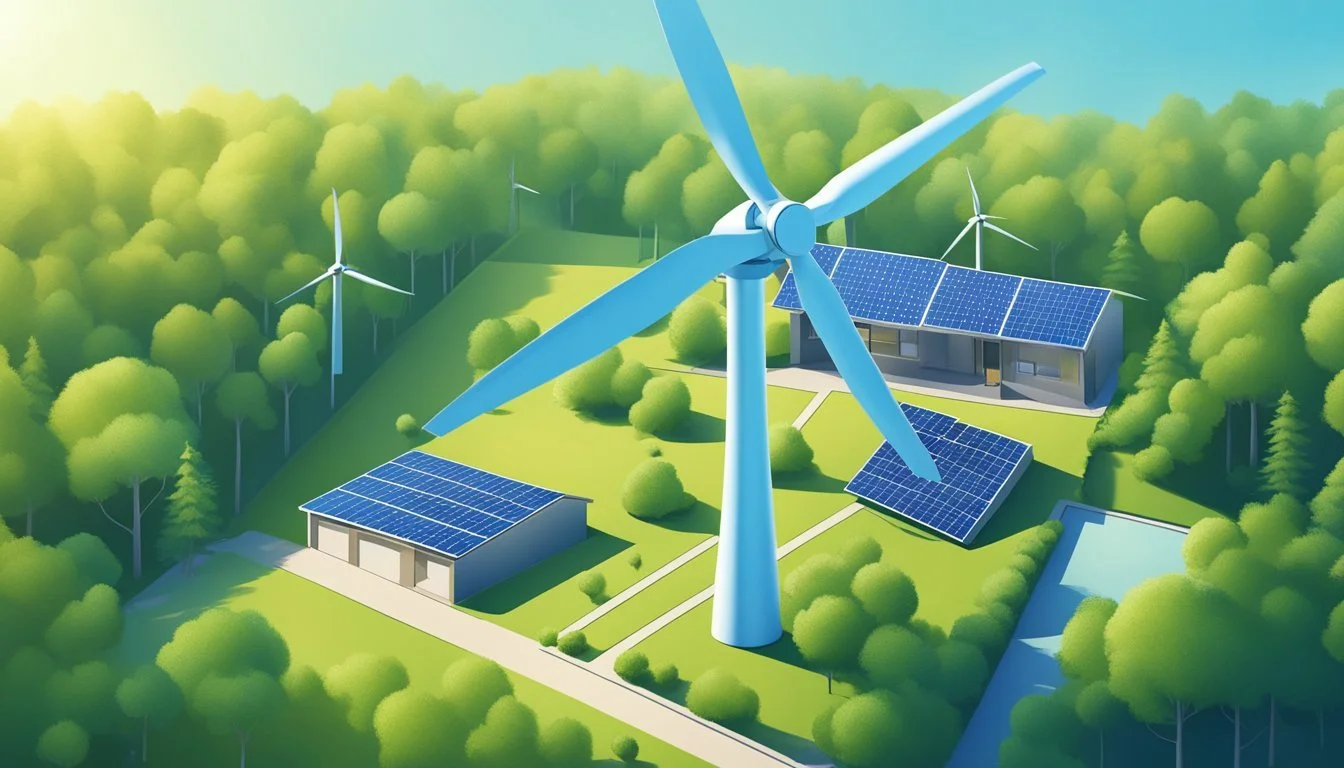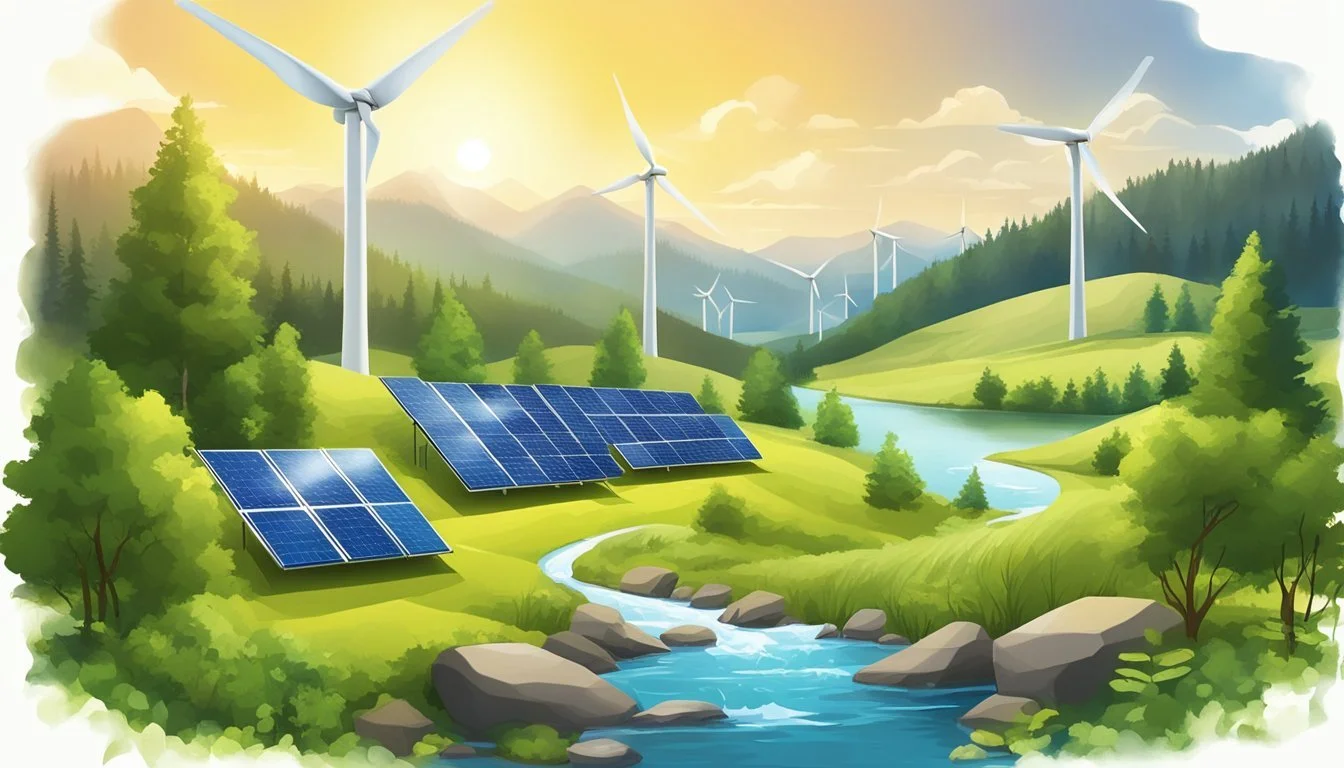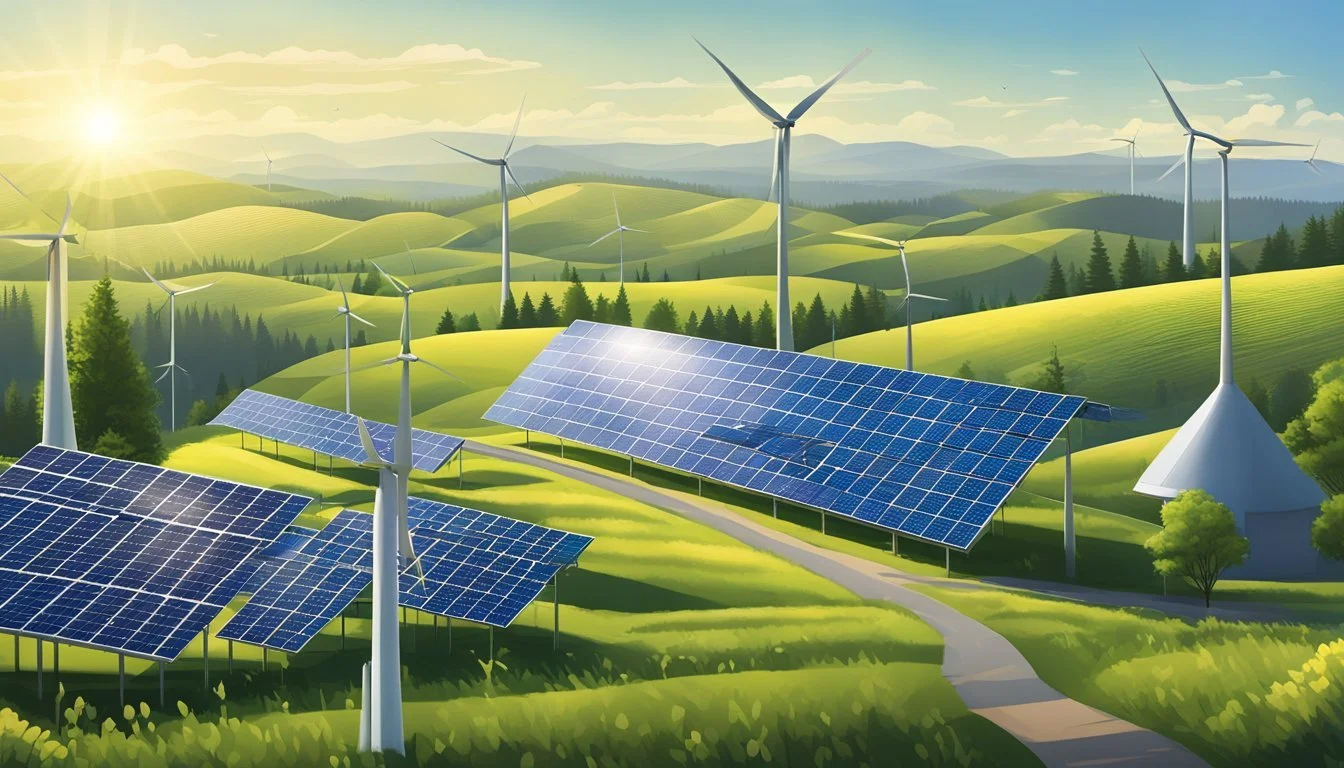Incentives for Renewable Energy and Conservation in Oregon
Maximizing Benefits & Opportunities
Oregon is actively promoting the transition towards sustainable energy use by offering a variety of incentives for both individuals and organizations aiming to invest in renewable energy and energy conservation. The state's commitment to a greener future is evidenced through programs that encourage the adoption of energy-efficient practices and renewable energy projects. These incentives are designed to reduce the initial investment hurdle, enabling more Oregonians to partake in the renewable energy movement and contribute to statewide conservation efforts.
The Oregon Department of Energy stands at the forefront of these initiatives, providing critical resources and financial support for energy-saving endeavors. This includes a range of projects from large-scale renewable energy installations to residential energy upgrades that collectively help in reducing carbon emissions and promoting environmental stewardship. By navigating the available incentives, such as tax credits, grants, and rebates, Oregon residents and businesses can significantly cut down on their energy costs while also benefiting the planet.
These incentives not only bolster local economies by fostering job creation within the green energy sector but also align with broader legislative efforts at the federal level. Acts like the Infrastructure Investment and Jobs Act and the Inflation Reduction Act have paved the way for increased funding and support for states like Oregon focusing on sustainable infrastructure and energy strategies. The collaborative approach between state and federal programs ensures that the path towards energy efficiency and renewable energy adoption is both accessible and advantageous for Oregon communities.
Overview of Oregon's Energy Landscape
Oregon's energy landscape is defined by its commitment to sustainability and the advancement of renewable resources. The Oregon Department of Energy (ODOE) plays a pivotal role in this progress, steering the state towards a cleaner energy future.
Current State of Renewable Energy in Oregon
Oregon is a leader in integrating renewable energy into its power grid, with significant investments in hydroelectric, wind, and solar power. Hydroelectric power stations contribute the largest share of Oregon's electricity generation, but wind and solar projects are on the rise, reflecting the state's dedication to diversifying its renewable energy portfolio. The development of these projects is supported by the Community Renewable Energy Grant Program, which facilitates planning and development for local renewable endeavors.
Role of the Oregon Department of Energy (ODOE)
The ODOE is instrumental in promoting energy efficiency and clean energy initiatives across the state. It provides strategic direction and funding through programs like the Energy Efficiency and Conservation Block Grant and the Renewable Energy Development Grants to enhance Oregon's energy resilience. These programs support a broad range of projects from local businesses, nonprofits to public bodies, thus ensuring that Oregon remains on the forefront of clean, efficient, and sustainable energy production.
Incentives for Renewable Energy Adoption
Oregon offers a range of incentives designed to encourage the adoption of renewable energy. These incentives include federal and state funding opportunities, tax credits, and rebates, particularly for solar and wind energy projects.
Federal and State Incentive Programs
Both federal and state programs provide significant incentives for renewable energy projects. On the federal level, incentives such as the Renewable Electricity Production Tax Credit (PTC) and the Investment Tax Credit (ITC) benefit individuals and businesses investing in renewable resources. The State of Oregon complements these with its programs through the Oregon Department of Energy (ODOE), which offers various incentives aimed at promoting the use of clean energy.
Solar and Wind Incentives
For solar energy, the Energy Trust of Oregon provides upfront incentives to help offset installation costs for residential and commercial solar electric systems. These incentives are designed to reduce the financial barrier for individuals and businesses interested in solar energy adoption. Similarly, wind energy projects can qualify for incentives, particularly in rural areas where wind farms are more feasible and can contribute to community renewable energy goals.
Grants and Rebates for Energy Projects
Oregonians have access to grants and rebates that can lower the costs of energy efficiency and renewable energy projects. Grants from entities like ODOE can cover a portion of the project costs, fostering energy savings and sustainability. Rebates, often offered by utility companies and the Energy Trust of Oregon, further decrease the out-of-pocket expenses for adopting green energy solutions, making renewable energy more accessible to a wider population.
Support for Energy Conservation and Efficiency
Oregon is committed to advancing energy conservation and efficiency initiatives, providing comprehensive support through incentives and programs. These efforts target a wide range of areas from individual home retrofits to broader infrastructure projects managed by consumer-owned utilities. The focus is on optimizing energy use, ensuring significant cost savings, and promoting environmental sustainability.
Energy Savings and Retrofit Programs
The State of Oregon facilitates several energy savings and retrofit programs designed to decrease energy consumption in homes and businesses. Building audits are a pivotal component, enabling property owners to identify opportunities for energy conservation. Financial incentives for making energy-efficient upgrades are often available. The Energy Efficiency and Conservation Block Grant offers funding for such initiatives, aimed at reducing energy use across the community.
Programs may include:
Rebates and incentives for installing insulation, efficient windows, and Energy Star appliances.
Access to low-interest loans for property owners to cover the upfront costs of retrofits.
Consumer-Owned Utilities and Public Support
Consumer-owned utilities (COUs) in Oregon receive support to implement energy efficiency measures that benefit their customers. COUs are instrumental in rolling out efficiency programs, direct incentives, and educational resources to help customers reduce their energy consumption and bills. Public support also extends to providing technical assistance and funding to COUs for them to develop and enhance their energy efficiency programs, fostering community-scale conservation efforts.
Public Support in Action:
Community education programs to inform consumers about energy-saving practices.
Infrastructure investments to modernize grid systems, accommodating more efficient energy distribution.
By investing in these areas, Oregon propels its commitment to a sustainable energy future through practical, accessible, and efficient energy conservation efforts.
Advancing Equity in Energy Programs
Equity in energy programs is increasingly emphasized in Oregon, where significant efforts are underway to ensure that disadvantaged communities and tribes have access to renewable energy and energy resilience opportunities.
Focus on Disadvantaged Communities
In Oregon, there is a deliberate emphasis on making renewable energy and energy resilience projects accessible to disadvantaged communities. For example, the Oregon Department of Energy has made $12 million available specifically to support these communities. This includes initiatives that prioritize not just access, but also the planning and construction of such projects, which can help reduce energy costs and promote sustainability.
Programs aim to involve community groups and communities of color in the decision-making process, allowing a more inclusive approach to energy planning. By empowering these groups, Oregon acknowledges the historical barriers they have faced and creates pathways for meaningful participation in the state's energy future.
Tribal Energy Programs
For Oregon tribes, there are targeted efforts to ensure they are central participants in energy advancements. Tribal energy programs are designed to support the unique needs of these communities, promoting self-sufficiency and resilience. The support ranges from financial incentives to technical assistance, with the dual purpose of honoring tribal sovereignty and environmental stewardship.
These programs recognize that tribes often have a deep connection to natural resources and a vested interest in sustainable practices. Resources are allocated to ensure tribes have the means to develop and implement renewable energy projects, which can provide long-term economic and environmental benefits for their communities.
Energy Resilience and Safety
Oregon prioritizes energy resilience and safety, understanding that reliable energy resources are critical during emergencies. The state has taken steps to strengthen emergency preparedness and enhance infrastructure resilience through various programs and initiatives.
Emergency Preparedness and Response
Oregon's energy strategy includes measures to maintain energy supply during adverse conditions. Emergency preparedness focuses on ensuring continuity of operations for essential services and enhancing the ability to recover rapidly from disruptions. Strategies include the establishment of emergency protocols and the promotion of energy resilience projects, such as those funded by the Community Renewable Energy Grant Program. These efforts are coupled with educational outreach to inform the public about energy safety in times of crisis.
Infrastructure Development for Resilience
Developing infrastructure that can withstand and quickly recover from disruptions is key to Oregon's approach. Investment in battery storage and microgrid technologies is prominent, allowing local energy systems to operate independently if needed. This is part of a broader view of infrastructure development for resilience, which also considers the physical hardening of energy assets and the use of smart grid technologies to automate responses to outages. By developing more robust energy systems, Oregon aims to provide a safer, more resilient energy landscape for its residents.
Sustainable Transportation Initiatives
Oregon is actively promoting sustainable transportation through targeted electrification initiatives and the development of extensive electric vehicle (EV) charging infrastructure. These measures are designed to reduce the state's carbon footprint and foster an environmentally conscious transportation sector.
Electrification and Electric Vehicles
Oregon has committed to the expansion of electric vehicle use throughout the state by implementing incentive programs that encourage the adoption of EVs. Among them, the state has rolled out tax credits aimed at reducing the upfront cost of purchasing electric vehicles. This financial support is intended to make EVs a more attractive option for consumers, thereby accelerating the transition away from conventional internal combustion engine vehicles.
Development of EV Charging Infrastructure
Recognizing the critical role of EV charging infrastructure in the adoption of electric vehicles, Oregon has invested in public charging stations to mitigate range anxiety and enhance the convenience of EVs. The aim is to create a network of chargers that are accessible and reliable, thereby supporting both long-distance travel and urban transportation. Partnerships with local governments and communities have led to projects that include solar-powered EV charging stations and municipal fleet chargers, ensuring that the charging ecosystem grows in tandem with the EV market.
Funding, Budgeting, and Program Development
In Oregon, the efforts to advance renewable energy and energy resilience are backed by structured funding and strategic program development. These initiatives hinge on the careful allocation of financial resources and the involvement of key stakeholders to ensure successful outcomes.
Understanding the ODOE Budget
The Oregon Department of Energy (ODOE) operates with a budget that reflects the state's commitment to fostering renewable energy projects. The budget includes a $50 million fund established by HB 2021, dedicated to planning and developing community renewable energy and energy resilience projects.
Program Development and Stakeholder Engagement
ODOE’s Community Renewable Energy Grant Program exemplifies program development with its transparent engagement process inviting input from Tribes, public bodies, and consumer-owned utilities. Funding available for these entities totals $12 million, supporting both the planning and construction phases of renewable energy projects. This stakeholder-centric approach strengthens the nexus between community needs and energy project outcomes.
Application and Award Processes
In the realm of renewable energy and conservation incentives in Oregon, the application and award processes are comprehensive and meticulous. Entities must thoroughly prepare their applications in accordance with the eligibility criteria and adhere to the stipulated deadlines to be considered for an award.
Eligibility and Application Procedures
Organizations aiming to apply for incentives must first verify their eligibility, which is detailed in the opportunity announcement. Eligible entities typically include Oregon Tribes, public bodies, and consumer-owned utilities among others. For instance, the Community Renewable Energy Grant Program accepts applications from these groups, specifying that public bodies include counties, municipalities, and special government bodies.
The application process requires proper preparation and gathering of necessary documentation. An applicant should carefully read the opportunity announcements to understand project eligibility criteria. As evident in resources like the Community Renewable Energy Grant Program's Application User Guide, applicants need to prepare and upload files pertinent to their proposal. A well-documented application enhances the possibility of a successful review.
Award Notification and Next Steps
After submission, applications undergo a review process, at the conclusion of which successful applicants receive an award notification. For example, the Renewable Energy Development Grants provided by the Oregon Department of Energy announce awards up to $250,000, notifying businesses and organizations that qualify.
Upon receiving the award notification, the next steps involve compliance with award conditions and typically project initiation. Organizations may be required to submit additional information or enter into a grant agreement to finalize the award process. The award notification also outlines the timelines and requirements for the utilization of the funds and the completion of the project.
Tracking and Enhancing Energy Projects
Optimizing the management of energy projects is crucial for their success. This entails diligent monitoring from inception through completion, while seeking opportunities for growth and improvement of renewable energy systems.
Monitoring Energy Use and Savings
Energy Projects play a pivotal role in Oregon's environmental objectives. Methods for monitoring energy use are employed to assess performance and gauge savings accurately. The state uses an interactive tool to help local governments and developers visualize energy progress and identify areas for enhancement.
Tracking Metrics:
Energy production
Consumption rates
Savings over time
Energy-saving initiatives benefit from this data, providing clear metrics for stakeholders to analyze and strategize.
Expanding Renewable Energy Systems
The growth of Renewable Energy Systems in Oregon is sustained through various incentives and support programs. Expansion is carefully planned to align with environmental, economic, and social goals. For instance, tax incentives like the Renewable Electricity Production Tax Credit (PTC) and the Investment Tax Credit (ITC) catalyze further development of renewable energy projects.
Expansion strategies:
Integration of new technologies
Enhancing grid capacity
Collaborative community projects
It is through these deliberate actions that Oregon continues to strengthen its renewable energy systems.
Frequently Asked Questions
What incentives exist for energy efficiency in Oregon?
The Energy Efficiency and Conservation Block Grant Program provides a formula award to support states and tribes in initiating energy-saving projects.
Who can apply for the Community Renewable Energy Grant Program?
Eligibility extends to Oregon Tribes, public bodies, and consumer-owned utilities, as indicated by the Community Renewable Energy Grant Program details.
Are there tax credits available for Oregon residents installing solar panels?
Yes, individuals may benefit from state tax credits and rebates. Information on the latest offerings for 2024 can be found under Oregon Solar Incentives, Tax Credits And Rebates Of 2024.
What kind of support does Oregon offer for renewable energy projects?
Oregon's Department of Energy assists in both energy-saving and renewable energy projects, as described on their Incentives page.
How does one find specific information about energy grants and incentives?
The Oregon Department of Energy's website provides access to various resources, such as a Frequently Asked Questions (FAQ) document, for more in-depth information on respective programs.
Is there funding for energy resilience projects?
House Bill 2021 created a fund to support the planning and development of energy resilience projects, accessible through the Community Renewable Energy Grant Program.










